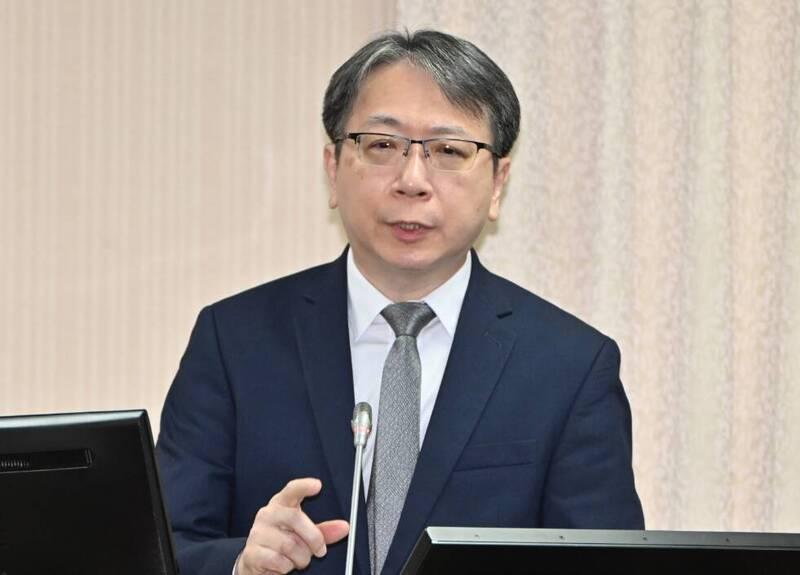China has been increasing cyberattacks, military exercises and ‘gray zone’ tactics against Taiwan in a combined effort to pressure the nation and deplete its resources, National Security Bureau (NSB) said today in a report to the Legislative Yuan.
The NSB submitted a written report to the Legislative Yuan today in preparation for NSB Director-General Tsai Ming-yen's (蔡明彥) meeting with the Foreign Affairs and National Defense Committee tomorrow.
Last year, the Chinese People’s Liberation Army (PLA) conducted the “Joint sword-2024A and B” military exercises around Taiwan and carried out 40 combat readiness patrols, the NSB said.

Photo: Tien Yu-hua, Taipei Times
In addition, Chinese military aircraft entered Taiwan airspace 3,070 times last year, up nearly 80 percent from 1,703 times in 2023, it said.
On March 17 this year, the PLA conducted two combat readiness patrols in a single day for the first time, the bureau said.
The PLA launched successive military exercises last Tuesday and Wednesday, amplifying psychological and military pressure against Taiwan, it added.
The bureau also pointed out that China is continuing to diversify its gray zone tactics, including expanding the use of drones to conduct surveillance around Taiwan.
China has also increased its use of weather balloons, the NSB said, releasing 76 so far this year as of March 19, compared with 147 throughout last year.
These balloons force Taiwan to dispatch monitoring forces, taking up responsive resources and undermining external communication resilience, it said.
The NSB intends to increase communication and intelligence cooperation with international partners and enhance its strategic analysis capabilities to strengthen Taiwan’s defenses against China, it said.
Regarding cognitive warfare, intelligence agents have recorded 510,000 instances of “controversial information” spread online by China so far this year, the bureau said.
China has been using state-run media, privately-run accounts, cyber-army groups and PR firms to manipulate public opinion, the NSB said.
China uses cognitive warfare to divide Taiwanese society by commenting on controversial issues such as the Taiwan Semiconductor Manufacturing Co’s (TSMC, 台積電) plans and operations in the US, it said.
Disinformation was found on online forums such as PTT and Dcard, plus social media platforms X and TikTok, though the majority were on Facebook, it said.
In addition, around 3,600 suspicious accounts were found, mostly on Facebook, it added.
Since last year, the Taiwanese government service network has registered a daily average of 2.19 million cyberattacks, mostly from China, it said.
Most cyberattacks were coordinated with political issues and the Chinese military exercises, showing how China is integrating information warfare with wider Taiwan-focused policies, it added.
The NSB said it had already established an automated monitoring and analysis platform to combine information provided by industry leaders, government officials, academics and intelligence agencies.
It would continue optimizing data protection, monitoring domestic and international cyberattack intelligence and deepening international cooperation to counter threats from China, it said.

Taiwan has received more than US$70 million in royalties as of the end of last year from developing the F-16V jet as countries worldwide purchase or upgrade to this popular model, government and military officials said on Saturday. Taiwan funded the development of the F-16V jet and ended up the sole investor as other countries withdrew from the program. Now the F-16V is increasingly popular and countries must pay Taiwan a percentage in royalties when they purchase new F-16V aircraft or upgrade older F-16 models. The next five years are expected to be the peak for these royalties, with Taiwan potentially earning

POSITIVE DEVELOPMENT: Japan and the US are expected to hold in-depth discussions on Taiwan-related issues during the meeting next month, Japanese sources said The holding of a Japan-US leaders’ meeting ahead of US President Donald Trump’s visit to China is positive news for Taiwan, former Japan-Taiwan Exchange Association representative Hiroyasu Izumi said yesterday. After the Liberal Democratic Party’s landslide victory in Japan’s House of Representatives election, Japanese Prime Minister Sanae Takaichi is scheduled to visit the US next month, where she is to meet with Trump ahead of the US president’s planned visit to China from March 31 to April 2 for a meeting with Chinese President Xi Jinping (習近平). Japan and the US are expected to hold in-depth discussions on Taiwan-related issues during the

‘LIKE-MINDED PARTNER’: Tako van Popta said it would be inappropriate to delay signing the deal with Taiwan because of China, adding he would promote the issue Canadian senators have stressed Taiwan’s importance for international trade and expressed enthusiasm for ensuring the Taiwan-Canada trade cooperation framework agreement is implemented this year. Representative to Canada Harry Tseng (曾厚仁) in an interview with the Central News Agency (CNA) said he was increasingly uneasy about Ottawa’s delays in signing the agreement, especially as Ottawa has warmed toward Beijing. There are “no negotiations left. Not only [is it] initialed, we have three versions of the text ready: English, French and Mandarin,” Tseng said. “That tells you how close we are to the final signature.” Tseng said that he hoped Canadian Prime Minister Mark Carney

STAY IN YOUR LANE: As the US and Israel attack Iran, the ministry has warned China not to overstep by including Taiwanese citizens in its evacuation orders The Ministry of Foreign Affairs (MOFA) yesterday rebuked a statement by China’s embassy in Israel that it would evacuate Taiwanese holders of Chinese travel documents from Israel amid the latter’s escalating conflict with Iran. Tensions have risen across the Middle East in the wake of US and Israeli airstrikes on Iran beginning Saturday. China subsequently issued an evacuation notice for its citizens. In a news release, the Chinese embassy in Israel said holders of “Taiwan compatriot permits (台胞證)” issued to Taiwanese nationals by Chinese authorities for travel to China — could register for evacuation to Egypt. In Taipei, the ministry yesterday said Taiwan